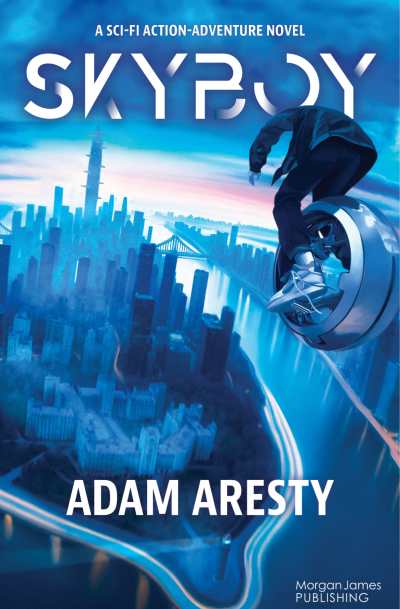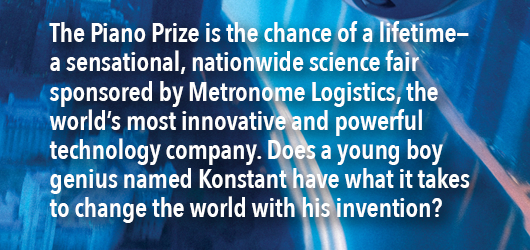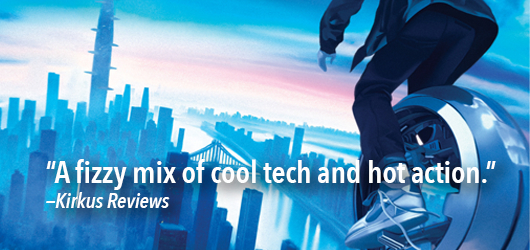"A fizzy mix of cool tech and hot action." --Kirkus Reviews

Reviewer Jennifer Maveety Interviews Adam Aresty, Author of Skyboy
Say what you will about AI’s effect on humanity but there’s one realm where just the idea of artificial intelligence has been transformative: science fiction. Indeed, there’s such a connection, it seems plausible to say that AI wouldn’t be what it is without imaginative sci-fi writers pushing the boundaries of science and technology in their stories—pushing dreams and nightmares into reality, as it were. More often than not, it’s the nightmare scenarios that get written.
While discussing his latest novel, today’s guest Adam Aresty expresses some misgivings about the doom-and-gloom: “With Skyboy,” he says, “I’m trying to buck the trend of dystopian sci fi (to some extent sci-fi in general) that the future is paved with destructive/killer/homicidal technology. AI is too easily villainized … I wanted to take the opposite approach here, where tech was awe-inspiring and actually had the ability to shape the world for good … it’s not so much the tech itself but whose hands it falls into.”
We’d say he succeeded. In her highly complimentary Foreword Clarion review, Jennifer Maveety calls Skyboy a “thrilling, futuristic” novel about advanced technology, showcasing both its “righteous and immoral” potential.
Adam took a break from his busy life as a screenwriter, fantasy game creator, and writing teacher at Fordham University to chat with Jennifer about Skyboy, AI, and his inspired world-building skills.
A central portion of the plot of Skyboy centers around a norovirus disease that caused world-wide chaos and destruction. How did the COVID-19 pandemic and its fallout influence your creation of the MX-13 virus?
I started a major rewrite of the manuscript that incorporated the MX-13 storyline in October, 2019. I was implementing notes from my agent on this rewrite through March 2020. As I began to watch COVID-19 spread and experienced lockdown in New York City, I grew extremely uncomfortable with the last six months of revisions I’d done—tragedy after tragedy was happening in the real world and it felt like I was drafting off the suffering of others. I almost scrapped the MX-13 story for some other form of plot device that would raise the stakes for Konstant’s world. But as I continued to live through a real life pandemic and attempted to teach college students remotely—young folks were facing a particular kind of mental and physical suffering and, over time, two things became apparent to me. First, the younger generation was becoming more and more frustrated by “adults” telling them how to live through tragedy and, second, no matter what the adults in the room said, it was these young folks who were going to figure things out on their own.
Skyboy’s story follows high schoolers who want to save the world so, by the time Morgan James showed an interest in the manuscript, and we started seeing the ripple effects of living through a pandemic, I knew the storyline would have meaning, having come full circle. By that point I felt strongly about leaving it in.
Konstant and his family are immigrants in the United States, often facing discrimination and hitches in their assimilation to American culture. What inspired you to weave in the trials immigrants often face and how do you feel Konstant’s story is pertinent in today’s social climate?
When Konstant first came to me as a character, I knew he was an outsider, a social pariah, and that status would shape his worldview. I didn’t know the specifics of why, but when I came to the idea of him as an outsider in this country, it all made sense. Personally, I drew on my great uncles and aunts who immigrated to America from Spain and Ugislavia and who would regale the younger generations with some of the trials they went through upon arriving here. Moreso, it gave Konstant and his family a bond, forcing them to be close and support one another, something I felt was important—the story has so much action and drama, I felt the heartwarming core would be Konstant’s family, since he had very few (if any) friends when we meet him.
Those who have the MX-13 virus are described as “carriers.” They face segregation and discrimination in nearly every aspect of daily life. What would you like readers to take away from this societal treatment?
Prejudice is everywhere and comes in many forms. The red pins carriers wear in the novel have many real world correlations, from the yellow stars Jews were made to wear by the Nazis to segregated bathrooms in the American South to the caste system in India. From a sci-fi perspective, what better metaphor for keeping Konstant isolated than literal physical distance and a kind of shunning from society. The truth is that these kinds of societal fences are completely man made and often cause utter pain and suffering. They prevent people from communicating well, from seeing one another as equals, and strip those who are isolated of their humanity. Ultimately, Konstant et al are trying to solve for this failure in society, so I’d like readers to understand that these types of barriers can be broken through innovation, collaboration, and understanding.
Bullying is a continuous conflict in this novel. Was it difficult to put Konstant in these experiences and how do you feel it influenced his character?
High school is such a microcosm of our world, and it shapes us into the adults we are today, whether we like it or not. I knew Konstant’s outsider status would carry over to his social life and it was interesting to put him into scenarios that tested his limits emotionally. Bullying in fiction is often treated like good vs. evil, which is how Konstant sees things when we first meet him. The most interesting thing happened when I placed the bully, Marcos, in the same disaster as the hero … once they went through the tragedy together, their beef seemed to evaporate and they could finally agree that, yes, they needed to work together in order to survive. This causes profound change in Konstant who ultimately chooses forgiveness as a path forward.
In the rise of technology and AI, do you see America’s future being similar to the near-dystopian setting of Skyboy? Is this novel meant to be a cautionary tale or a proponent of influential tech and how so?
With Skyboy, I’m trying to buck the trend of dystopian sci-fi (to some extent sci-fi in general) that the future is paved with destructive/killer/homicidal technology. AI is too easily villainized by way of a walking Terminator, or a teleportation is deadly when a small fly gets in one of the transport pods, or cloned dinosaurs that run amok—you get the idea. I wanted to take the opposite approach here, where tech was awe-inspiring and actually had the ability to shape the world for good. This is no easy task, however, and in the book the world is breaking down at a faster pace than any tech can potentially keep up with.
I think, like most things, it’s not so much the tech itself but whose hands it falls into. This is where the good vs. evil intent question comes in. And in a capitalist society where this tech will ultimately be commodified, that intent gets very hazy and difficult to see as one or the other, especially when decisions are being made by adults. Once I took the choices out of their hands and gave them to the young folks at the center of the story, it began to take a more hopeful direction.
Class hierarchies underline many aspects of this novel and the disadvantages created by wealth disparity. What lessons do you think society should garner from how these inequalities are presented in Skyboy?
I needed obstacles for all my characters—some rich, some poor. These societal disparities in the novel were not only timely, but acted as a pretty nimble story device. The poor are surely preyed upon. And in the case of Rose Novick, daughter of the world’s richest man, she grapples with an inability to enact change due to other privileged people who stand in her way. Once disaster strikes, everyone must put aside their differences in order to survive, underscoring the thematic question of how humanity will overcome adversity. The only way through is together.
The death of Konstant’s mother, Alina, propels Konstant to enter Metronome’s contest despite his economic and emotional hardships. What message do you hope to send to young adults who may feel afraid or unprepared to express their ideas and dreams?
When I began writing this book I was still processing the complex grief of the passing of my own father and, inevitably, I channeled some of those feelings into the story. The truth is that, for all the lessons he attempted to instill in me, when push came to shove, I had to learn the hard way how the world worked. He could have given the best pep talk ever in the history of dad pep talks, but I had to walk out into the world and be brave—it’s scary out there. I’ll give you one example: My dad didn’t fully understand or support my desire to write stories, often asking me when I was going to “get a real job” or how my “hobby” was going. As an impressionable young teen who was often seeking the approval of my father, this was difficult to overcome. However, out there in the world, I did find people who supported me and understood me and shepherded me in the right direction. These were teachers, mentors, peers. They read my work, gave me feedback and we supported one another.
So my advice to young folks who might feel scared about going out into the world with their passion projects is to surround yourself with the support you need—these things don’t happen overnight and trying to go it alone can be overwhelming. There’s a coda to my story about my father. A week before he passed, he dropped me off at the airport. I was flying to Berlin to shoot my first film, Stung. Neither of us knew it would be the last time we’d see one another, but he gave me a hug and said how proud he was of me.
I was really intrigued by the post-pandemic and highly technological world you described. What inspired your choice for world-building and were there any elements you chose to leave out? If so, why?
While watching some of my favorite science fiction films like Blade Runner or The Fifth Element or any scenes set on the planet Coruscant in Star Wars, I always marvel at the fact that there are flying cars in those futures. Maybe it was my time living in Los Angeles, stuck in traffic and daydreaming of pushing a button on my car’s dash and putting it into “fly mode” to escape the freeways, but I started wondering about those worlds and our sci-fi future. Who builds the first flying car? was my prompt for Skyboy. Once I decided that young people would probably engineer something akin to those cars we see zipping through the air, the story started writing itself. I broke down the components I thought would be needed for such a technological marvel, assigned them to each of the characters central to the plot, and I effectively reverse engineered my story.
In terms of future elements I chose to leave out: Not in particular, though I think I have left AI sort of in the background of the world of Skyboy. Its rise in our world has been so swift and I began writing the novel before any of that was really on the horizon. I’m amending this for the sequel!
Skyboy
A Sci-Fi Action-Adventure novel
Adam Aresty
Morgan James (May 6, 2025)
Clarion Rating: 4 out of 5
A meek immigrant comes into his own with the help of friends in the gripping science fiction novel Skyboy.
In Adam Aresty’s thrilling, futuristic science fiction novel Skyboy, advanced technology can be used for both righteous and immoral motives.

Konstant is a teenager who lives with his sister and uncle. His family immigrated to the United States from a war-torn nation. After his mother’s pandemic death, Konstant is labeled a “carrier” and is forced to wear a red pin denoting his proximity to the virus.
With vaccines only accessible to the ultrawealthy, Konstant decides to enter a technology contest hosted by megacorporation Metronome. His hopes of earning enough money to afford the daily vaccine are challenged as he faces the wrath of a schoolyard bully, Marcos; a competing technology firm; and an unknown informant threatening to destroy him.
The story moves with swift immediacy through moments of suspense and unforeseen plot twists. While Konstant works to find the mole who’s attempting to dismantle Metronome, he teams up with Rose, the daughter of Metronome’s founder. Konstant, Rose, and Konstant’s fellow competitors are thrust into peril on repeat, evading drones, hijacked AI robots, and adults who want them dead. Such action scenes are crucial; the group struggles to determine where the next threat will come from, resulting in continual investment. The greatest revelation comes at the end of the novel, though, after which an even greater uncertainty is born.
The book’s characterizations are multifaceted. At the start of the book, Konstant is meek, uncertain of himself, and plagued by the discrimination he faces as a carrier. When he decides to stand up for himself and reenter the competition, he exemplifies determination and bravery. Other contest entrants face the same upward trajectory thanks to their cooperation and friendships. Indeed, as intense situations arise that require them to work together, Marcos and Konstant’s relationship begins to heal and Marcos transforms from villain to comrade.
Konstant’s relationships with his family members, friends, and his love interest, Rose, are developed via conversations, some of which are stilted. Clichés like “the rest is history” and “look alive” also undermine the story’s realism. Repeating phrases like “jeez” also exist in notable contrast to the book’s quick, exciting action. More compelling are the story’s implicit critiques of wealth disparities and discrimination against immigrants, as well as its projections for the future in the face of unchecked technology.
The complex science fiction novel Skyboy is about what technology can provide and what it can take away.
Reviewed by Jennifer Maveety
May 1, 2025
Jennifer Maveety



